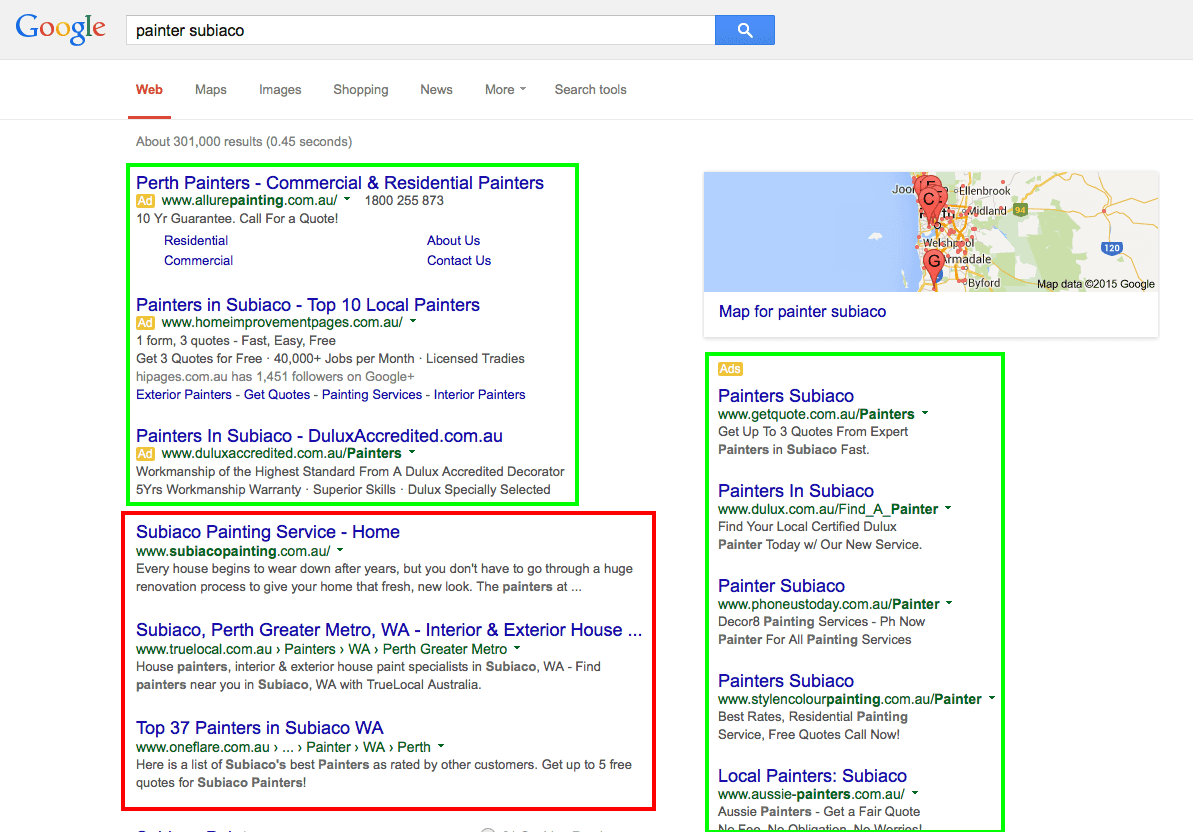What’s the difference between SEO and SEA?
In the realm of digital marketing, there are a couple of terms that pop up time and time again – “SEO” and “SEA”. Seasoned webmasters, marketing professionals and forward thinking business owners won’t have a problem differentiating the two. But to the rest of the population, what do these buzz words mean?
Let’s start with SEO.

SEO stands for Search Engine Optimisation. It is the process of optimising a website so that search engines like Google favour ranking it in the Organic Results on the Search Engine Results Page, on top of other websites which are about the same/similar subject.
Sound like a mouthful? Don’t worry; SEO can be a bit hard to explain in words but easier to demonstrate in practice.
Here’s a screenshot of the Search Engine Results Page, after someone has searched for “Painter Subiaco” in Google.

The Organic Results are highlighted in Red. These results are “natural”, and are what Google believes are the most relevant website results in relation to the search query “Painter Subiaco”. Intuitively, this makes sense, if we consider why someone would be typing “Painter Subiaco” into Google in the first place. In all likelihood, we can assume the user is looking for a painter to paint a property in the suburb of Subiaco. Hence why a result for a Subiaco Painting Service is present, along with a local directory site that lists painters in the Subiaco area, and another listing site, which also lists different Painter ratings by previous customers.
So why are these results on the first page, and not the 301,000 others Google found? The answer is simple – because Google believes these results are the most relevant, reputable and provide the most value to the user.
Google’s ability to find the most relevant results for any search query is what has made it the world’s biggest search engine. Much of this success is due to its ability to not just find the best results, but also in weeding out the poor ones. Would you be satisfied Googling “Painter Subiaco”, but getting results about Painters in Fremantle? You might be looking for a painter, but not in Fremantle, so such a result isn’t very helpful. Google knows this, and endeavours to ensure that this doesn’t happen. Providing value to users is the endgame for Google.
In addition to relevance, the other half of the Google equation is reputation. In our “Painter Subiaco” example, there isn’t just one painter operating in Subiaco – there are probably dozens, which could all be considered relevant. To decide which results to rank first, Google checks how “popular” the website is. Popularity is determined by how much people are linking back to the site, which is called backlinking. More backlinks suggest people are essentially talking about and recommending the site to others online, making it more popular and valuable in Google’s eyes. This works on the assumption that a popular website contains more useful information compared to a less popular one.
Carrying out SEO for your website is first clearly determining your target market and what they are likely to be searching for on Google, and then making your website as relevant as possible to these users, while working on improving your online reputation through good backlinking methods. Due to the size of the web, this is an arduous process that requires dedication and patience, often taking months of reputation building work to show fruitful results. But it’s definitely worth it – the more relevant and reputable your website is, the higher you’ll rank on Google’s Organic Results. The higher you rank on Google, the more beneficial search engine traffic you will receive.
Let’s move on to SEA.

SEA stands for Search Engine Advertising, which is also referred to as PPC or Pay-Per-Click. It is the process of advertising directly on Google and other similar search engines. Ad Results are displayed on top and to the right of the Organic Results on the Search Engine Results Page.
Here’s that screenshot again.

Ad Results are highlighted in Green, which are clearly labelled with an “Ad” icon. The key difference between Ad Results and Organic Results is that you pay Google to have your Ad show up. SEA is often referred to as PPC, because it works on a Pay-Per-Click model – you set up an account and ad budget within Adwords, Google’s advertising platform, and each time a user clicks on your ad, you get charged a fee from Google. The more you are willing to pay for a click, the higher your Ad will appear on the Search Engine Results Page.
How much you are willing to pay for a click, called a bid amount, is set manually within your Adwords account. Depending on your industry and competitors, it can get very expensive, very fast to keep your ads visible. But this comes with the key advantage of having your website show up instantly on Google.
This isn’t to say that there aren’t any guidelines when it comes to SEA other than how much you can pay. SEO principles still apply to SEA, particularly in regards to relevance. With Adwords, you have control over what search phrases to target, what ad copy you’d like to show up on Google, and what landing page from your website you’d like users to end up on. The more relevant your ad copy and website landing page is to the search phrase you are targeting; the less you need to pay when the user clicks on your ad. That means you can afford more clicks to your site versus your competitor who has less relevancy in their ad copy and landing page.
Managing Adwords is a time consuming affair, due to the fact you can target an almost limitless amount of keywords. In order to maintain relevancy for each keyword, each ad copy and landing page needs to be tailored and relevant to keep your costs down. There is also the need to ongoing and vigilant bid management to ensure your budget is utilised as efficiently as possible. Then there should be continual analysis to see which ads are performing well and which are not, and then adjusting your campaign accordingly.
In Summary – SEO vs SEA
Done correctly, Search Engine Advertising can very quickly and effectively send traffic to your website, at a cost. This differs significantly from SEO, where it sometimes takes months for Google to recognise your optimisation efforts and rank your site in the Organic Results – but you don’t pay anything directly to Google.
The long term ROI for properly implemented SEO far outweighs SEA, as users generally trust Organic Results far more than Ad Results, with the added advantage of not needing to pay for every click. However, the short term gain potential from SEA is excellent if you are in need of an immediate and targeted boost in traffic to your website.
| SEO | SEA | |
|---|---|---|
| Conversion Tracking Detail |  |
 |
| Relevant Traffic |  |
 |
| Location Specific Targeting |  |
 |
| Time Specific Targeting |  |
 |
| Immediate Results |  |
 |
| Short Term ROI (1-6 months) |  |
 |
| Long Term ROI (6+ months) |  |
 |
If you’d like to know more about SEO or SEA, feel free to give Clue a call on 9368 0777 and our friendly team will be happy to chat to you!







